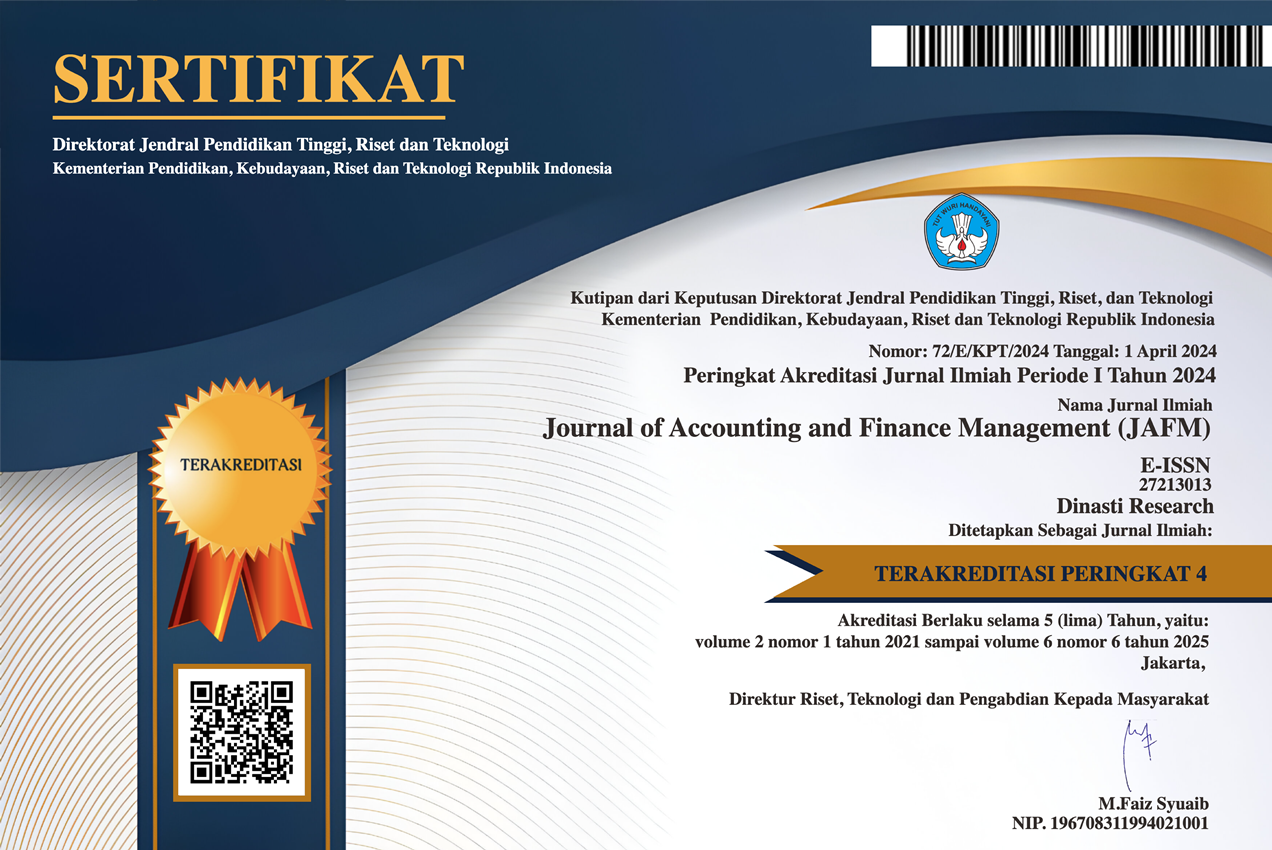The Influence of Education Level, Work Discipline, and Work Stress on Employee Productivity at CV.XYZ
DOI:
https://doi.org/10.38035/jafm.v5i2.492Keywords:
Education Level, Work Discipline, Work Stress, Work ProductivityAbstract
This study aims to determine the effect of education level, work discipline and work stress on employee productivity at CV. XYZ. The method used in this research is quantitative method with descriptive and verification approaches, the population used is 42 respondents of CV employees. XYZ by using saturated samples. Based on the results of the research conducted, it can be seen that the level of education has no effect on work productivity and the relationship between the level of education and productivity is 1.1. As well as Work Discipline affects Work Productivity by 3.5% and the relationship between work discipline and work productivity is 0.186 or 18.6%. And work stress affects productivity by 16.2% and the relationship between work stress and productivity is -0.402 or -40.2%. The results of the coefficient of determination analysis test show that the level of education, work discipline and work stress affect productivity by 40.5% while the remaining 59.5% is influenced by other factors not included in this study.
References
Afandi. 2018. Manajemen Sumber Daya Manusia (Teori, Konsep dan Indikator). Nusa Media. Yogyakarta
Agustini, Fauzia. (2019). Strategi Manajemen Sumber Daya Manusia. Medan: UISU Press.
Amarsyah, A. D. (2020). Identifikasi Faktor-Faktor Yang Mempengaruhi Produktivitas Sdm (Studi Kasus Pada Karyawan Bank Btn Syariah Malang). Jurnal Ilmiah Mahasiswa FEB, 8(2).
Apriyani, N., Jaya, R. C., & Nuradina, K. (2023). The Impact That Work Environment, Work Motivation, And Work Discipline Have on The Performance of Hammer Strong Bandung Employees. Journal of Business and Management INABA (JBMI), 2(02), 111-130.
Ariani, D. R., Ratnasari, S. L., & Tanjung, R. (2020). Pengaruh rotasi jabatan, disiplin kerja, dan beban kerja terhadap produktivitas kerja karyawan. Jurnal Dimensi, 9(3), 480-493.
Arikunto, Suharsimi. 2017. Prosedur Penelitian Suatu Penelitian Praktis.Penerbit: Rineka Cipta, Jakarta.
Fuad Ihsan. (2008). Dasar-dasar kependidikan. Jakarta: Rineka Cipta.
Ghozali, Imam. (2018). Aplikasi Analisis Multivariate Dengan Program IBM SPSS 25. Semarang: Badan Penerbit Universitas Diponegoro
Handoko, T.H. 2011. Manajemen Personalia dan Sumberdaya Manusia. Edisi Kedua. Cetakan Kedelapan belas. Yogyakarta: Penerbit BPFE
Hasibuan, M. (2022). Pengaruh Tingkat Pendidikan dan Disiplin Kerja terhadap Kinerja Pegawai pada Dinas Sosial Pemerintah Kota Padang Sidimpuan. Formosa Journal of Multidisciplinary Research, 1(6), 1329-1340.
Hasibuan, Malayu S.P. (2017). Manajemen Sumber Daya Manusia. Edisi Revisi. Jakarta:Bumi Aksara
Mangkunegara, A.A. A.P. (2017). Managemen Sumber Daya Manausia Perusahaan.Bandung: PT. Remaja Rosdakarya
Muttaqin, R., Indrianti, R. P., Siddiq, A. M., Wijaya, F., & Jaya, R. C. (2023). Improving employee performance: The role of self-efficacy and motivation. Jurnal Kajian Manajemen Bisnis, 12(1), 01-09.
Nurwidyani, S. E., Jaya, R. C., Utami, W. N., Mubarok, D. A. A., & Ismail, G. D. (2024). The Effect of Work from Home, Digital Platform and Digital Literacy on Employee Productivity at PT. XYZ Cirebon Regency. Dinasti International Journal of Management Science, 5(3), 468-474.
Prabowo, B. P. S. (2016). Pengaruh Tingkat Pendidikan dan Penempatan Terhadap Produktivitas Kerja Karyawan Pada PT. Industri Kapal Indonesia, Bitung. Jurnal Berkala Ilmiah Efisiensi, 16(4).
Rismayadi, B. (2015). Faktor-faktor yang mempengaruhi produktivitas karyawan (studi kasus pada CV Mitra Bersama Lestari Tahun 2014). Jurnal Manajemen & Bisnis Kreatif, 1(1).
Rivai, Veithzal. (2018). Manajemen Sumber Daya Manusia untuk Perusahaan: dari Teori ke Praktik, Jakarta: Raja Grafindo Persada
Rahmawati, I., Bagis, F., & Darmawan, A. (2021). Analisis Pengaruh Pelatihan, Motivasi dan Stres Kerja terhadap Produktivitas Karyawan pada PT Hyup Sung Indonesia. Derivatif: Jurnal Manajemen, 15(2), 317-328.
Sasongko, A. Y. (2018). Pengaruh Kepuasan Kerja Dan Pengalaman Kerja Terhadap Loyalitas Karyawan (Studi Kasus Pada PT. Dong Young Tress Indonesia). https://doi.org/10.18041/2382-3240/saber.2010v5n1.2536
Saleh, A. R., & Utomo, H. (2018). Pengaruh disiplin kerja, motivasi kerja, etos kerja dan lingkungan kerja terhadap produktivitas kerja karyawan bagian produksi di pt. inko java semarang. Among Makarti, 11(1).
Sedarmayanti. 2017. Manajemen Sumber Daya Manusia. Bandung: Refika Aditama
Sugiyono. (2012). Metode Penelitian Bisnis. Bandung: Alfabeta
Sugiyono. (2017). Metode Penelitian Kuantitatif, kualitatif dan R&D. Bandung: Alfabeta.
Sugiyono, (2021). METODE PENELITIAN KUANTITATIF KUALITATIF dan R&D (M.Dr. Ir. Sutopo, S.Pd (ed); ke3 ed)
Sutrisno, Edy. 2016. Manajemen Sumber Daya Manusia. Cetakan Kedelapan. Jakarta: Prenadamedia Group
Sutrisno, 2019. Manajemen Sumber Daya Manusia. Cetak ke sebelas. Prananda Media Group, Jakarta
Syahputra, F. A. R., Jaya, R. C., & Mubarok, D. A. A. (2023). The Influence of Self-Esteem, Rewards, and Work Ethic on Productivity. Dinasti International Journal of Digital Business Management, 4(6), 1140-1152.
Syekh, S. (2019). Pengaruh Pendidikan dan Pengalaman Kerja Terhadap Kinerja Pegawai di Kantor Camat Tungkal Ilir Kabupaten Tanjung Jabung Barat. J-MAS (Jurnal Manajemen dan sains), 4(1), 102-110.
Wirawan, K. E., Bagia, I. W., & Susila, G. P. A. J. (2018). Pengaruh Tingkat Pendidikan Dan Pengalaman Kerja Terhadap Kinerja Karyawan. Image: Jurnal Riset Manajemen, 7(1), 38– 44. https://doi.org/10.17509/image.v7i1.23137
Downloads
Published
How to Cite
Issue
Section
License
Copyright (c) 2024 Monita Suryafni Limbong, Rama Chandra Jaya

This work is licensed under a Creative Commons Attribution 4.0 International License.
Authors who publish their manuscripts in this journal agree to the following conditions:
- The copyright on each article belongs to the author(s).
- The author acknowledges that the Journal of Accounting and Finance Management (JAFM) has the right to be the first to publish with a Creative Commons Attribution 4.0 International license (Attribution 4.0 International (CC BY 4.0).
- Authors can submit articles separately, arrange for the non-exclusive distribution of manuscripts that have been published in this journal into other versions (e.g., sent to the author's institutional repository, publication into books, etc.), by acknowledging that the manuscript has been published for the first time in the Journal of Accounting and Finance Management (JAFM).
























